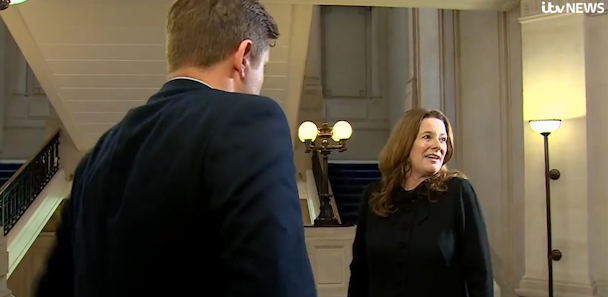Gillian Keegan and the lasting dangers of the 'hot mic'
As another government minister is caught off guard but on camera, The Drum's editor-in-chief Gordon Young wonders if broadcasting the candid clip risks souring trust in politicians and media even further.

Gillian Keegan was caught on ITV News's microphones
Gillian Keegan has learned a valuable lesson: never go off script when wearing an ITV lapel mic.
The UK's education secretary was the subject of a proper ‘gotcha’ moment when at the end of an interview on crumbling concrete in schools she lapsed into a bout of honesty.
Assuming the recording had ended, she asked why she wasn’t being thanked for “doing a fucking good job” while “everyone else sat on their arses and did nothing”.
The quote reproduced in bald cold type misses the nuances of how she sounded – and there was more of a hint of irony there. However, thanks to the speed ITV published the video news reports suggest she is in a fight to hold on to her job.
Education secretary Gillian Keegan is recorded on camera saying others ‘have been sat on their a***s’ on schools Raac crisis and shares frustration about not being thanked for doing ‘a f***ing good job’https://t.co/c02gI4dXiM pic.twitter.com/jWbYTVZl5D
— ITV News Politics (@ITVNewsPolitics) September 4, 2023
If she goes it is not the first government scalp ITV News can claim thanks to the hot mic. It broke the story of former press secretary Allegra Stratton, a former ITV colleague no less, after she was caught joking on a leaked video about lockdown-breaking parties at number 10.
Advertisement
They are great stories. But they are also evidence that when it comes to politics, journalism is increasingly cutthroat. In this new world, the ends – particularly the ones that work well on social – justify some pretty brutal means.
Now, since the Conservatives have been in power for the past 13 years, most of the recent examples that spring to mind relate to the Tories.
Matt Hancock, the former health secretary, being burned by his ghostwriter, Isabel Oakeshott, is perhaps the most glaring. She signed an NDA to write his memoirs but then released the 100,000 WhatsApp messages he gave her to inform her research to The Telegraph.
Advertisement
But the trend was also evident in the dying days of the last Labour government. The most famous example was when then prime minister Gordon Brown was the subject of a Sky News hot mic row.
After an encounter with a Labour supporter, who challenged him on immigration policy, he got into his car forgetting that his mic was still live, and was heard describing the person as ‘that bigoted woman’.
Sky chose to broadcast the remarks, and eight days later Labour lost the election.
Editors would weigh the pros and cons of publishing such material. Normally, for example, they may want to stay on cordial terms with the government of the day.
Suggested newsletters for you
However, that calculation will change if the individual or regime is deemed to be on the way out. Burning someone on the brink of losing power may be a risk worth taking.
However, is such a scorched-earth approach really in the long-term interests of journalism? It would seem to confirm the popular view that the profession is not one to be trusted.
And of course, any writer who has ever gained insights from an off-the-record briefing knows that having honest conversations with sources can give more insight than the official on-the-record version.
But in this new world, I suspect a lot more politicians will be a lot less open, and much more reluctant to show their human side. Nobody will win here – not the media, not the politicians and certainly not the electorate.

